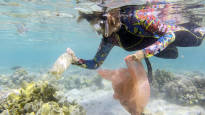A delicate coral paradise with clear water will be destroyed if the algae get a lot of nutrients.
At the bottom of the Red Sea now lies a ticking environmental disaster.
The British cargo ship Rubymar, carrying a huge cargo of fertilizer, sank a week ago. It was bombed by Yemen’s Houthi rebels on February 18.
Now both the corals of the Red Sea and other marine life are in danger, as tens of thousands of tons of fertilizers are in danger of spreading into the Red Sea.
Estimates of the amount of cargo are 21,000 tons or 41,000 tons according to different sources.
Algae growth is likely to ramp up due to fertilizers. Such a quantity of fertilizer can cause, in addition to massive deposits of algae, dead areas in the sea and starve the corals to lack of light.
– That’s a huge amount of fertilizer in a horrible place, says the director of the University of Jordan’s marine science station Ali Al-Sawalmih news agency Reuters.
Also the prime minister of Yemen Ahmed Awad bin Mubarak has said that spreading fertilizers into the sea would be an unprecedented environmental disaster.
Greenpeace’s Middle East and North Africa program director Julien Jreissati estimates for the news agency Al-Jazeera that if fertilizers mix with seawater, it can derail the marine ecosystem and affect the food chains of the sea area.
According to some estimates, fish can die from ammonia poisoning in excessive nutrient concentrations.
At the moment, there is no information yet whether the ammonium nitrate or ammonium phosphate in the ship’s cargo gets mixed with seawater.
Yemeni government environmental authorities reviewed for The Guardianthat the effects may affect 78,000 fishermen and their families or even half a million people.
– People live a simple life relying on one source of income, fishing. We need extensive international cooperation to adapt to these effects, said Ahmed MuthannaRed Sea Fisheries Authority to Reuters.
The Red Sea is a delicate coral paradise. It is considered one of the best diving spots in the world.
The relatively shallow and clear coastal waters are rich in corals. Marine ecologists have estimated that they may be the only corals in the world that can survive climate change.
In addition to fertilizers, the ship has already leaked oil into the sea. According to estimates, that too would be more than 200 tons. That alone can harm the area’s marine life.
The Yemeni government has requested international assistance to mitigate the social and environmental problems caused by the sinking of the Rubymar.
Before sinking, the ship waited two weeks after the hits. During this time, towing to safer waters was planned. It could not be done when port authorities in Aden, Djibouti and Saudi Arabia refused to accept the ship at their ports.
The British-owned, Belizean-flagged and Lebanese-operated cargo ship Rubymar is the first ship sunk by the Huthi rebels. It sank last weekend in a narrow strip of sea between Yemen and Eritrea, where the water is about 100 meters deep.
The rebels say they are acting in solidarity with the Palestinians in Gaza in the war between Israel and Gaza. Their leader Mohammed Ali al-Houthi has said on the messaging service X that new similar damage can be prevented if the Prime Minister of Great Britain Rishi Sunak allows aid to be flown to Gaza.
The EU and the United States are just starting to ship food to Gaza.
